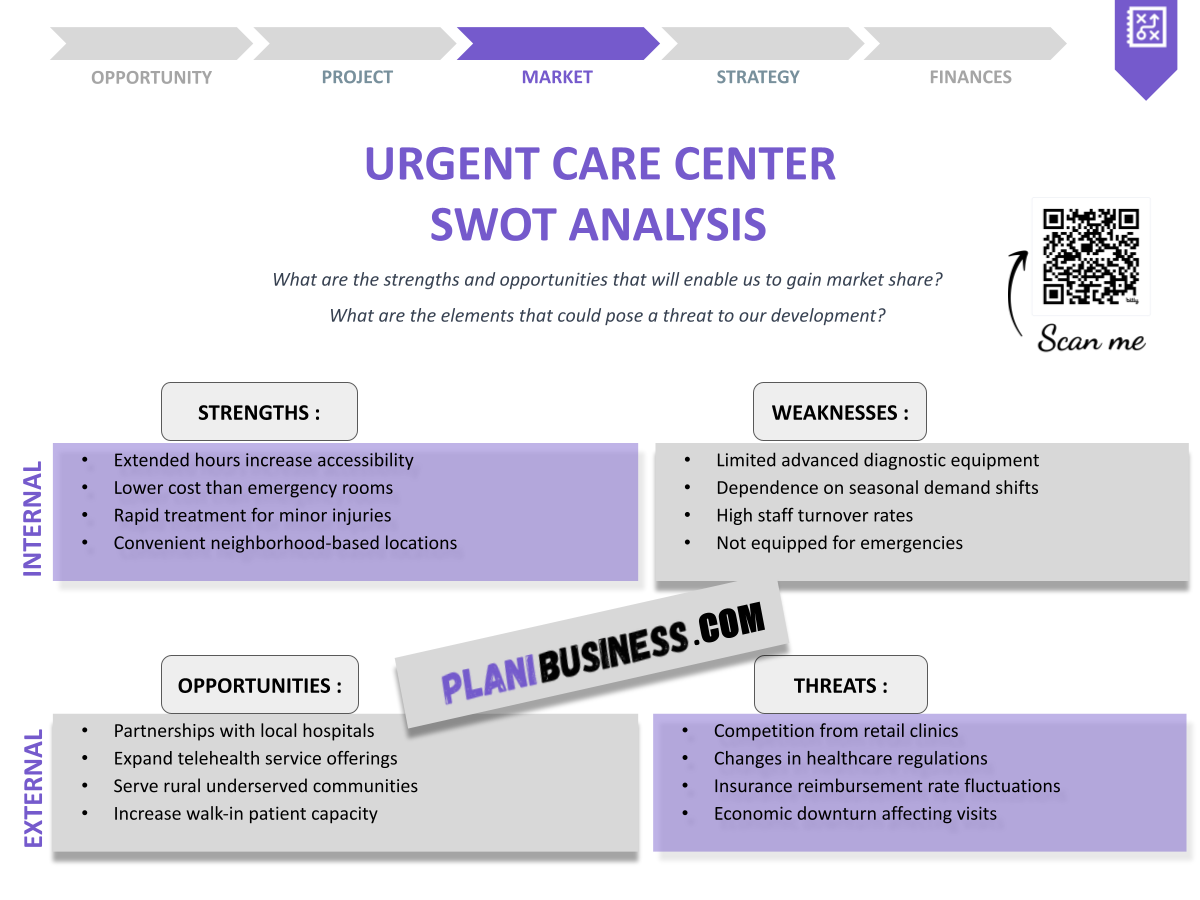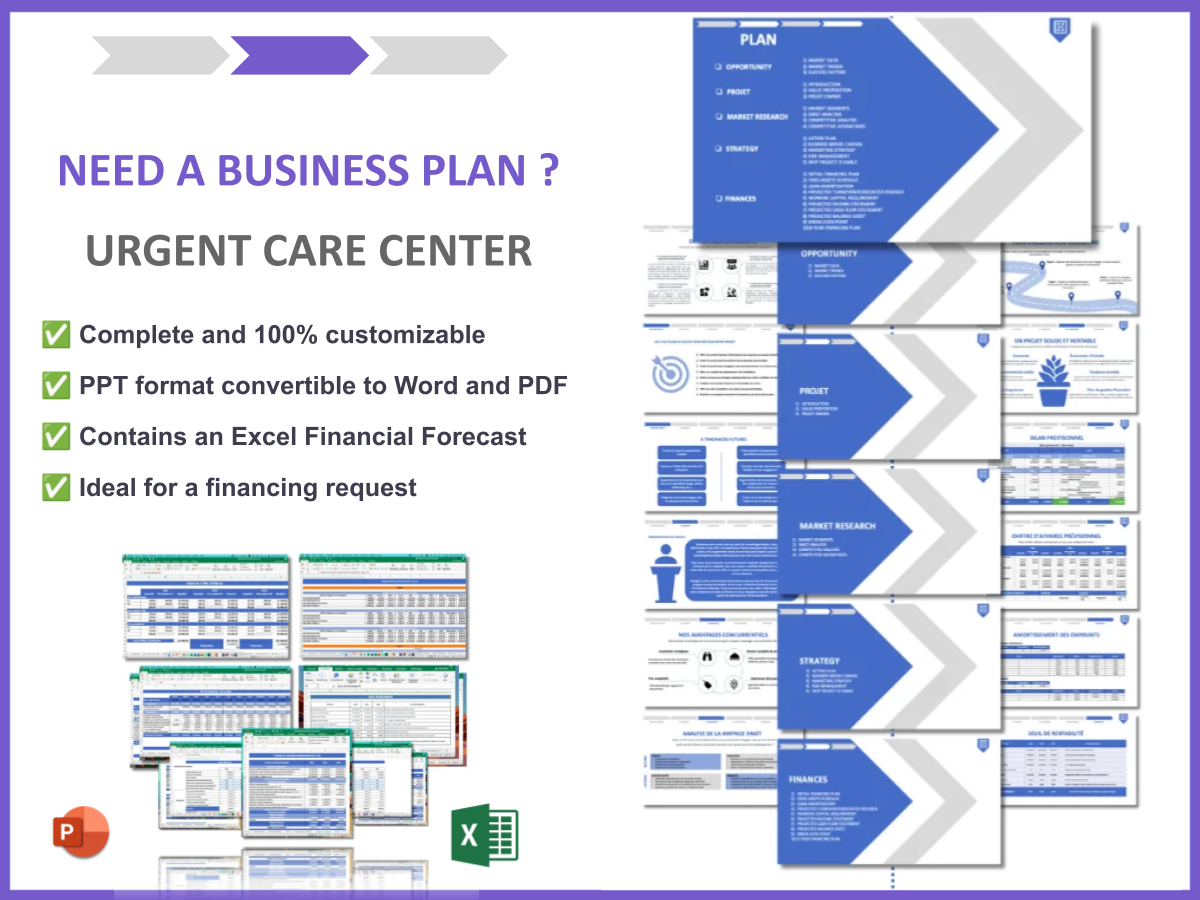Why Should You Have a SWOT Analysis for Your Urgent Care Center?
Did you know that nearly 60% of urgent care centers struggle to maintain a steady flow of patients? This surprising statistic underscores the need for a solid strategy in the healthcare landscape. A SWOT analysis for your urgent care center is essential for understanding where you stand and how to improve.
A SWOT analysis identifies your center’s Strengths, Weaknesses, Opportunities, and Threats, helping you make informed decisions. By understanding these elements, you can enhance operational efficiency and patient satisfaction.
10 Key Points to Remember:
- Importance of identifying strengths
- Recognizing weaknesses to improve services
- Exploring opportunities in the market
- Assessing threats from competitors
- Making data-driven decisions
- Improving patient care and satisfaction
- Aligning resources effectively
- Enhancing community engagement
- Adapting to healthcare trends
- Developing a strategic growth plan
How Do You Write a SWOT Analysis for Your Urgent Care Center?
Creating a SWOT analysis involves a systematic approach. Let’s break it down:
Strengths
Your urgent care center may have several strengths that set it apart from competitors. These could include:
- Unique services such as extended hours or specialized care.
- Highly qualified medical staff with extensive experience.
- Advanced technology or equipment that enhances patient care.
- A strong reputation supported by positive patient feedback.
Weaknesses
Identifying weaknesses is just as crucial. Consider:
- Areas where your center may lack resources or adequate staffing.
- Negative feedback from patients regarding service delays.
- Financial constraints that could limit your center’s growth.
- Challenges in marketing or engaging with the community.
Opportunities
Look for potential opportunities in the market:
- Partnerships with local hospitals or clinics to enhance services.
- Emerging health trends that your center can capitalize on.
- The possibility of expanding service hours or offerings.
- Community health initiatives that could benefit from your center’s involvement.
Threats
Lastly, assess the threats facing your center:
- Competition from other urgent care centers or local hospitals.
- Regulatory changes that could impact operations.
- Economic downturns that could affect patient volume.
- Changes in healthcare policies that could pose risks.
SWOT Example N°1 for Your Urgent Care Center
Here’s a real-world example of how a SWOT analysis helped an urgent care center improve its operations.
| SWOT | Analysis |
|---|---|
| Strengths | Experienced staff with specialized training |
| Weaknesses | Limited marketing presence in the community |
| Opportunities | Potential partnerships with local fitness centers |
| Threats | Increasing competition from new urgent care facilities |
Resume-Liste:
- Experienced staff enhances patient care.
- Limited marketing hinders visibility in the community.
- Partnerships can expand patient reach and engagement.
- Competition poses challenges to maintaining patient volume.
By leveraging strengths like experienced staff, the center can focus on improving its marketing strategies to attract more patients.
SWOT Example N°2 for Your Urgent Care Center
Another urgent care center used a SWOT analysis to refine its services and enhance its market position.
| SWOT | Analysis |
|---|---|
| Strengths | Advanced technology and equipment |
| Weaknesses | High operational costs affecting profitability |
| Opportunities | Expansion into telehealth services |
| Threats | Changing healthcare regulations impacting operations |
Resume-Liste:
- Advanced technology improves efficiency and patient outcomes.
- High operational costs challenge financial stability.
- Telehealth can attract new patients and enhance service delivery.
- Regulatory changes may affect service offerings and compliance.
Investing in telehealth services could mitigate the threat of changing regulations while attracting tech-savvy patients.
SWOT Example N°3 for Your Urgent Care Center
This example illustrates how a center successfully identified its market position through a SWOT analysis.
| SWOT | Analysis |
|---|---|
| Strengths | Strong community ties and local reputation |
| Weaknesses | Inadequate staff training programs |
| Opportunities | Participation in community health fairs |
| Threats | Economic downturn affecting patient visits |
Resume-Liste:
- Community ties foster patient loyalty and trust.
- Staff training needs improvement to enhance service quality.
- Health fairs can boost visibility and attract new patients.
- Economic downturns may lead to reduced patient volume.
Engaging in community health fairs can be an opportunity to showcase services and strengthen community ties, especially during challenging economic times.
SWOT Example N°4 for Your Urgent Care Center
Here’s how another urgent care center navigated its challenges using a SWOT analysis.
| SWOT | Analysis |
|---|---|
| Strengths | Convenient location with high foot traffic |
| Weaknesses | Poor online presence and digital marketing |
| Opportunities | Leveraging social media for patient engagement |
| Threats | Local health trends shifting patient preferences |
Resume-Liste:
- Location attracts foot traffic and potential patients.
- Online presence needs enhancement to reach a broader audience.
- Social media can engage patients and promote services.
- Local health trends may shift demand away from traditional services.
Improving online presence can help the center reach more patients and capitalize on local health trends, ensuring sustained growth and relevance.
SWOT Example N°5 for Your Urgent Care Center
This urgent care center utilized a SWOT analysis to grow strategically and enhance its service offerings.
| SWOT | Analysis |
|---|---|
| Strengths | Diverse range of services including urgent and preventive care |
| Weaknesses | Staffing shortages during peak hours |
| Opportunities | Expanding services to include mental health support |
| Threats | New competitors entering the market |
Resume-Liste:
- Diverse offerings meet varied patient needs and attract different demographics.
- Staffing shortages hinder service delivery, especially during busy times.
- Expanding services can attract new patients and address community needs.
- New competitors challenge market share and patient loyalty.
Addressing staffing shortages will be crucial for expanding services and staying competitive in a growing market.
SWOT Example N°6 for Your Urgent Care Center
This example highlights how another urgent care center navigated its challenges based on insights from a SWOT analysis.
| SWOT | Analysis |
|---|---|
| Strengths | Experienced leadership team with a clear vision |
| Weaknesses | Limited funding for new initiatives |
| Opportunities | Applying for grants to support service expansion |
| Threats | Industry consolidation affecting smaller centers |
Resume-Liste:
- Leadership guides strategic decisions and fosters innovation.
- Funding limitations restrict growth and new service offerings.
- Grants can provide necessary resources to support initiatives.
- Consolidation poses risks to smaller urgent care centers and market competition.
Seeking grants could alleviate funding issues and support growth initiatives, helping the center maintain its competitive edge.
SWOT Example N°7 for Your Urgent Care Center
This example showcases how a SWOT analysis provided key insights for another urgent care center to improve its operations.
| SWOT | Analysis |
|---|---|
| Strengths | High patient satisfaction ratings and positive reviews |
| Weaknesses | Inconsistent service hours affecting patient access |
| Opportunities | Implementing customer feedback programs to enhance services |
| Threats | Rising operational costs impacting profitability |
Resume-Liste:
- High satisfaction leads to referrals and repeat patients.
- Inconsistent hours frustrate patients and deter visits.
- Feedback programs can enhance services and address patient concerns.
- Rising costs challenge overall profitability and sustainability.
Implementing a customer feedback program can help address service inconsistencies and maintain high satisfaction, ultimately driving growth.
SWOT Example N°8 for Your Urgent Care Center
Here’s how this urgent care center adapted its strategies based on insights from a SWOT analysis.
| SWOT | Analysis |
|---|---|
| Strengths | Strong referral network within the community |
| Weaknesses | Low brand awareness among potential patients |
| Opportunities | Community outreach programs to boost visibility |
| Threats | Market saturation with similar healthcare providers |
Resume-Liste:
- Referrals boost patient volume and build trust.
- Brand awareness needs improvement to attract new patients.
- Outreach initiatives can enhance visibility and community engagement.
- Saturation limits growth potential and challenges patient retention.
Community outreach initiatives could significantly increase brand awareness and attract new patients, ensuring the center's long-term success.
SWOT Example N°9 for Your Urgent Care Center
This example illustrates how another urgent care center successfully utilized a SWOT analysis to refine its service offerings and market positioning.
| SWOT | Analysis |
|---|---|
| Strengths | Comprehensive care covering both urgent and preventive needs |
| Weaknesses | Limited insurance acceptance affecting patient access |
| Opportunities | Expanding insurance partnerships to broaden patient base |
| Threats | Policy changes that could impact operational compliance |
Resume-Liste:
- Comprehensive care attracts diverse patients and meets various needs.
- Insurance limitations restrict access and deter potential patients.
- Partnerships can broaden insurance acceptance and enhance patient access.
- Policy changes may affect compliance and operational processes.
Expanding insurance partnerships could enhance patient access and mitigate the impact of potential policy changes, ensuring continued growth.
SWOT Example N°10 for Your Urgent Care Center
A final example that shows the effectiveness of a SWOT analysis for another urgent care center.
| SWOT | Analysis |
|---|---|
| Strengths | Innovative treatments that attract tech-savvy patients |
| Weaknesses | Staff burnout affecting service quality |
| Opportunities | Developing wellness programs to enhance patient engagement |
| Threats | Negative online reviews impacting reputation |
Resume-Liste:
- Innovative treatments attract patients looking for cutting-edge care.
- Staff burnout negatively impacts service delivery and patient satisfaction.
- Wellness programs can enhance engagement and provide additional value.
- Negative reviews can damage the center’s reputation and deter new patients.
Addressing staff burnout is crucial for maintaining quality service and positive online reviews, which are vital for attracting and retaining patients.
Conclusion
In conclusion, conducting a SWOT analysis for your urgent care center is vital for navigating the complexities of the healthcare industry. By identifying your strengths, weaknesses, opportunities, and threats, you can make informed decisions that lead to improved patient care and operational efficiency. If you’re looking for a structured approach to launching your center, consider utilizing a comprehensive business plan template for Urgent Care Center that can guide you through the process.
Additionally, to further enhance your knowledge and planning, check out our articles on How to Launch an Urgent Care Center? and How to Develop an Urgent Care Center Marketing Plan? With Example. These resources will provide you with valuable insights and actionable strategies to ensure your center’s success.
Frequently Asked Questions
1. What is a SWOT analysis?
A SWOT analysis is a strategic planning tool used to identify the Strengths, Weaknesses, Opportunities, and Threats facing an organization, helping to inform decision-making.
2. Why is a SWOT analysis crucial for urgent care centers?
It helps urgent care centers understand their market position and formulate strategies to enhance patient care and operational effectiveness.
3. How frequently should a SWOT analysis be conducted?
It is recommended to perform a SWOT analysis annually or whenever significant changes occur within the market or your organization.
4. What are common strengths of urgent care centers?
Typical strengths include experienced staff, advanced technology, and convenient locations that enhance patient access.
5. What weaknesses should be addressed?
Weaknesses may include inadequate staffing, financial constraints, and insufficient marketing efforts that hinder visibility.
6. How can opportunities be identified?
Opportunities can be identified by analyzing market trends, community needs, and potential partnerships that can enhance service delivery.
7. What threats should urgent care centers be aware of?
Threats may include competition from other healthcare providers, regulatory changes, and economic fluctuations that impact patient volume.
8. Can a SWOT analysis improve patient satisfaction?
Yes, by addressing weaknesses and leveraging strengths, a SWOT analysis can lead to better patient experiences and increased satisfaction.
9. How can I implement the findings from a SWOT analysis?
Use the insights gained to develop strategic plans, allocate resources effectively, and set measurable goals to enhance overall performance.
10. What resources are necessary for conducting a SWOT analysis?
Resources needed include data on operations, patient feedback, market research, and input from staff and stakeholders to ensure a comprehensive evaluation.







